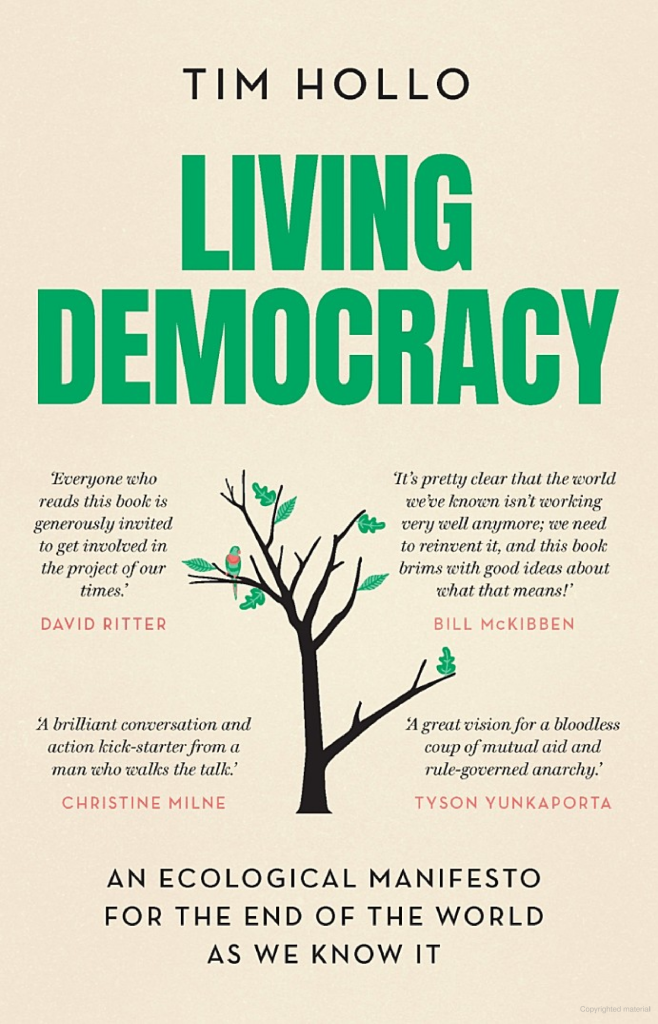FEATURE ARTICLE -
Issue 91: Mar 2023, Reviews and the Arts
Author: Tim HolloPublisher: NewSouth BooksReviewer: Stephen Keim
Tim Hollo brings a broad experience – as a musician, political adviser, political candidate, community activist, and chief executive of the Green Institute – to Living Democracy, a synthesis of political, economic and philosophical ideas, directed to revolutionising the approach of community activists to meeting the ecological crisis and transforming societal organisation and governance.
Hollo conceives of traditional forms of governance – from traditional parliamentary democracies to authoritarian forms and from socialist to the embrace of capitalism – as anti-ecological and removed from implementing the wishes of people generally, in favour of those of a narrow governing class and the desires of extractivist corporations and their lobbyists.
Hollo draws on the writings of Italian Marxist philosopher, Antonio Gramsci for a vision of the way in which prevailing (anti-ecological) norms are maintained through a network of values, myths, stories, caricatures and received common sense ideas as well as the coercive forces of state agencies. As a guide to action, Gramsci’s ideas lead to an emphasis upon the re-writing of such prevailing ideas through communication and community action as a path to changing the way society works and building new pathways to a new way of societal functioning from which the book’s title is derived, namely, a living democracy.
Hullo’s title refers not only to a different form of society but the process of creating that new order of things, namely, the practice of living democracy. Hollo draws on great systems’ theorist, Donella Matthews, for the proposition that seeking to control individual elements of an existing system will often make matters worse. The key is to change the paradigms and power structures of the system.
Hollo traces many of the myths of anti-ecological thought to the writings of John Locke and Thomas Hobbes, particularly, the latter’s view of human nature as giving rise, in the absence of strong central government, to a life that was nasty, brutish and short. A modern articulation thereof is Garrett Hardin’s 1968 essay, The Tragedy of the Commons, in which the absence of private property is said to lead to a prisoner’s dilemma in which every individual strives to maximise their individual yield, and, in doing so, depletes and destroys the common resource.
In refutation of Hardin’s simplistic thesis , Hollo points to Nobel prize winning economist Elinor Ostrom’s study of actual commons’ management in history. Ostrom’s study identifies the way in which commons have operated over historical epochs according to complex series of rules which ensure that everyone benefits and the common resource is preserved. Hollo points to the way in which economics textbooks and university courses still promote Hardin’s evidence free and refuted view of history and human nature because it reinforces the underlying view of human nature on which the prevailing defence of anti-ecological capitalism is based.
In the same way, Hollo calls out the famous 1968 Stanley Milgram psychology experiment in which participants were instructed to inflict electric shock torture on other human beings in order to induce skill learning and Philip Zimbardo’s 1971 Stanford Prison experiment and its famous production of abuse of prisoners in a fake prison environment. Hollo points out that, despite the results of both experiments having been exposed as affected by academic fraud, they continue to be promoted in academic circles, inter alia, because they support a view of human nature, convenient to adherents of strong central government, as nasty and brutish.
Hollo challenges the prevailing concept of selfish man on which much of capitalist and anti-ecological thought is based with the idea of people working together to create plenty to be shared rather than scarcity to be exploited. Much of this derives from Ostrom’s seminal study of commons’ management demonstrating that people can and do manage shared resources effectively to create better results for everyone dependent on the resource.
Hollo’s approach also draws upon modern understandings of Darwinian evolution as being more than the individualistic triumph of tooth and claw which gave rise to the crude visions of Social Darwinism. Hollo draws upon the work of turn of the twentieth century Russian political philosopher and evolutionary thinker Pyotr Kropotkin, who pointed to the way in which, in nature, groups and individuals engage in mutual assistance giving rise to patterns of co-evolution and symbiosis.
Hollo also draws upon the modern biological writings of Lyn Margulis whose work articulated the way in which even primitive mono-cellular organisms are the product of symbiotic cooperation between even more primitive organisms and how complex organisms including the human body depend on symbiotic relationships for the individual organism to survive. Where would we be without our gut bacteria? Nowhere is the simple answer.
Hollo describes the natural world as working as a series of cycles working on a series of timescales in which all elements play a role in defining how the cycle operates and evolves. He gives to these natural phenomena the name “panarchy”, reflecting that all elements play a role in the natural governance process.
Hollo also draws upon human history for a vision of alternating states between populations managing their own common resources, themselves, on the one hand, and the rise of centralised power structures by which the commons are enclosed and devoted to the enrichment of the powerful few, on the other. In this, he seizes upon the work of a number of authors including agrarian anthropologist James C Scott, who describes the rise of centralized kingdoms who sought to coerce their subjects into living cheek by jowl in cities so that they could be exploited and controlled and the periodic breakdown of these hierarchical communities by ordinary people resisting and escaping to re-establish agrarian communities ruled in cooperation by the members of the communities.
According to Hollo and his sources, human history does not indicate, despite its prevailing articulation, that centrally ruled, hierarchical societies are the necessary result of time’s arrow.
Hollo’s posited methodology for creating a living democracy is for people to create their own structures for cooperating – in defiance of capitalism’s desire to create scarcity – to create plenty by sharing resources and making their own rules for the way in which these enterprises are governed. He gives examples such as “No Buy” campaigns; city farms; suburban libraries; and cooperative recycling ventures.
As a political example, Hollo refers to the short lived and bloodily suppressed Paris Commune of 1871. Hollo also draws on more contemporary examples. Since 2015, Barcelona en Comu, a citizen’s democracy group seeking to boost an economy of social and environmental justice and to democratize institutions so that people can decide on the city they want has exercised municipal power in Barcelona including through the office of mayor, Ada Colau, who had worked for many years as a housing and anti-evictions activist.
Hollo’s more extraordinary modern example is the Kurdish nation known as Rojava created in north eastern Syria, at the same time as battling ISIS, on the principles of democratic confederalism. Rojava brings together three autonomous regions based on principles articulated by jailed (by Turkey) Kurdish leader, Ocalan. Rojava describes itself as creating a model of democracy that might actually bring stability to a war-torn region as well as battling ISIS.
Dissatisfaction with different existing models of government, whether left or right in their ideological principles, is not irrational. However, the instinctive tendency, normally, is to shrug one’s shoulders, eschew the task of creating new societal models and to make the best of whatever system with which one happens to be stuck. It is now, however, nearly 35 years since James Hansen addressed a congressional committee on a hot summer’s day in Washington to warn of a coming global warming. Since, despite the passage of that 35 years, governments of all persuasion, despite their professed best intentions, are unwilling or incapable of making the necessary changes to reverse the planet’s trajectory to unlivability, the question of the best form of government to make rational decisions about the community’s best interests presents itself with renewed urgency.
For Hollo, transforming society and its governance is more rational and feasible than persuading imperfect government to do the right thing.
On our present trajectory, it is hard to argue that he is wrong.



